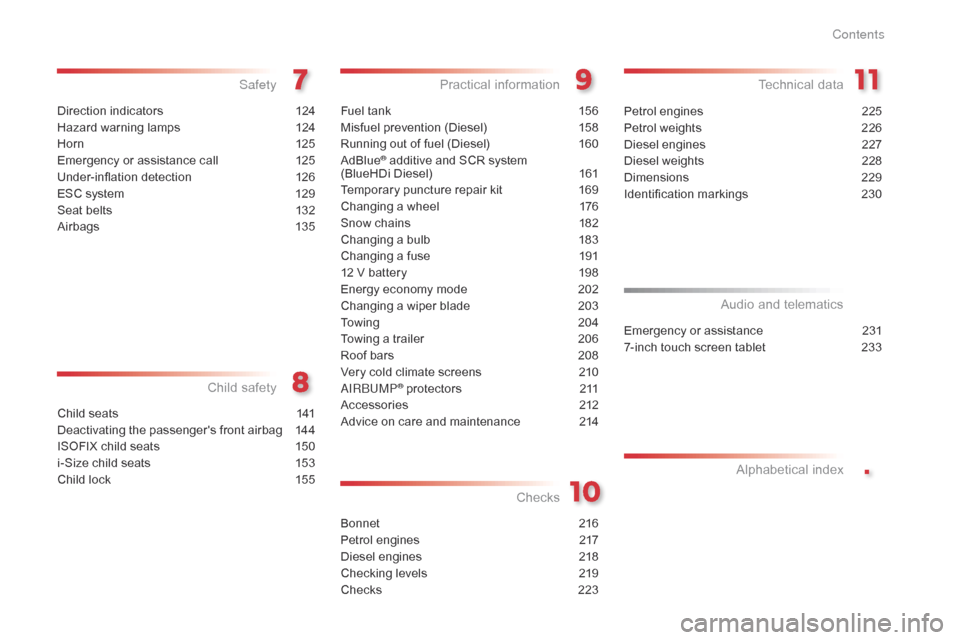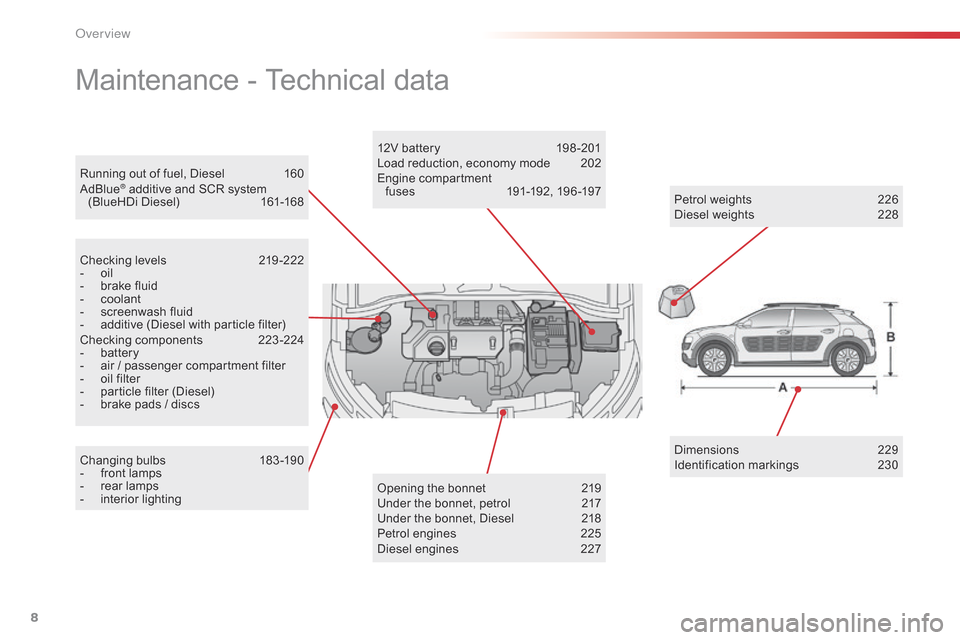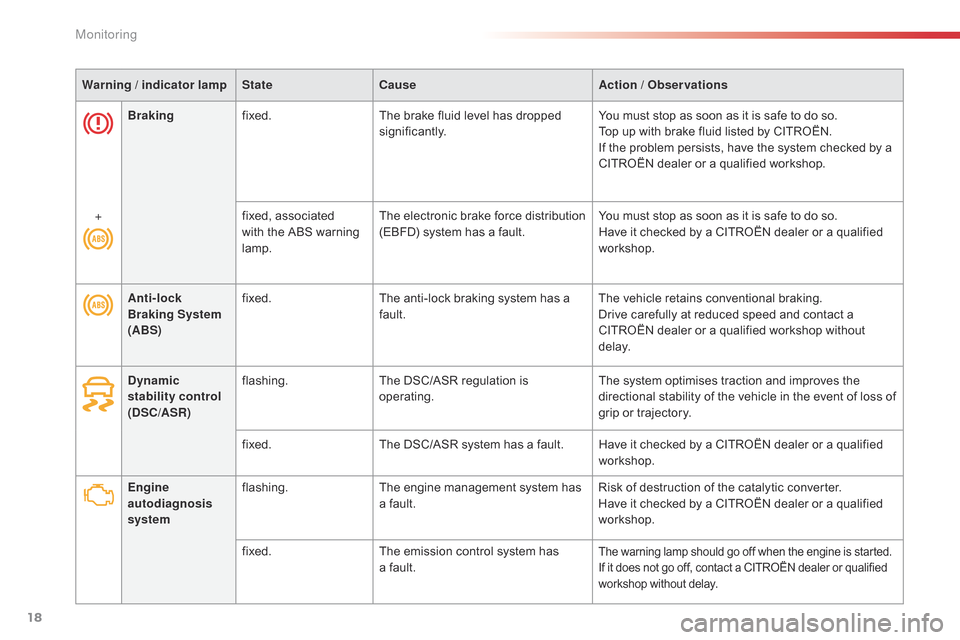check engine Citroen C4 CACTUS RHD 2015 1.G Owner's Manual
[x] Cancel search | Manufacturer: CITROEN, Model Year: 2015, Model line: C4 CACTUS RHD, Model: Citroen C4 CACTUS RHD 2015 1.GPages: 326, PDF Size: 8.56 MB
Page 5 of 326

.
Direction indicators 124
Hazard warning lamps
1
24
H or n
12
5
Emergency
or assistance call
1
25
Under-inflation
d
etection
1
26
ESC
system
1
29
Seat
belts
1
32
Airbags
1
35
Safety
Child seats 1 41
Deactivating the passenger's front airbag
1
44
ISOFIX
child seats
1
50
i-Size
child seats
1
53
Child
lock
1
55
Child safety
Checks
Fuel tank 156
Misfuel prevention (Diesel)
1
58
Running
out of fuel (Diesel)
1
60
AdBlue
® additive and SCR system
(
BlueHDi Diesel) 1 61
Temporary
puncture repair kit
1
69
Changing
a wheel
1
76
Snow
chains
1
82
Changing
a bulb
1
83
Changing
a fuse
1
91
12
V
battery
1
98
Energy
economy mode
2
02
Changing
a wiper blade
2
03
To w i n g
2
0 4
Towing
a trailer
2
06
Roof
bars
2
08
Very
cold climate screens
2
10
aI
R
b
UM
P
® protectors 2 11
Accessories
2
12
Advice
on
care and maintenance
2
14
Practical information Technical da ta
Emergency or assistance 231
7-inch touch screen tablet
2
33
Audio and telematics
Alphabetical
in
dex
Bonnet 2 16
Petrol engines
2
17
Diesel
engines
2
18
Checking
levels
2
19
Checks
2
23Petrol
engines
2
25
Petrol weights
2
26
Diesel engines
2
27
Diesel weights
2
28
Dimensions
2
29
Identification
ma
rkings
2
30
Contents
Page 10 of 326

8
Running out of fuel, Diesel 160
AdBlue® additive and SCR system (
BlueHDi Diesel) 1 61-168
Maintenance - Technical data
Checking levels 2 19 -222
- o il
-
b
rake fluid
-
c
oolant
-
s
creenwash fluid
-
a
dditive (Diesel with particle filter)
Checking
c
omponents
2
23-224
-
b
attery
-
a
ir / passenger compartment filter
-
o
il filter
-
p
article filter (Diesel)
-
b
rake pads / discs
Changing
bu
lbs
1
83-190
-
f
ront lamps
-
r
ear lamps
-
i
nterior
l
ighting Dimensions
2
29
Identification
ma
rkings
2
30
Petrol
weights
2
26
Diesel weights
2
28
Opening the bonnet
2
19
Under
the bonnet, petrol
2
17
Under
the bonnet, Diesel
2
18
Petrol
engines
2
25
Diesel
engines
2
27
12V
battery
1
98 -201
Load reduction, economy mode
2
02
Engine
c
ompartment
f
uses
19
1-192,
19
6 -197
over view
Page 12 of 326

10
Limit the causes of excess consumption
Spread loads throughout the vehicle; place the heaviest items in the bottom of the boot, as close as possible to the rear seats.
Limit
the loads carried in the vehicle and reduce wind resistance (roof
b
ars, roof rack, bicycle carrier, trailer...). Use a roof box in preference.
Remove
roof bars and roof racks after use.
At
the end of winter, remove snow tyres and refit your summer tyres.
Observe the recommendations
on maintenance
Check the tyre pressures regularly, when cold, referring to the label in the door aperture, driver's side.
Carry
out this check in particular:
-
b
efore a long journey,
-
a
t each change of season,
-
a
fter a long period out of use.
Don't
forget the spare wheel and the tyres on any trailer or caravan.
Have
your vehicle serviced regularly (engine oil, oil filter, air filter,
p
assenger compartment filter...) and observe the schedule of
o
perations recommended in the maintenance and warranty guide.
When
refuelling, do not continue after the third cut-off of the nozzle to
a
void any over flow.
At
the wheel of your new vehicle, it is only after the first 1 800 miles
(3
000 kilometres) that you will see the fuel consumption settle down to
a
consistent average.
Eco-driving
Page 20 of 326

18
Warning / indicator lampStateCause Action / Observations
Engine
autodiagnosis
system flashing.
The
engine management system has
a
fault.Risk
of destruction of the catalytic converter.
Have
it checked by a CITROËN dealer or a qualified
w
orkshop.
fixed. The
emission control system has
a f
ault.
The warning lamp should go off when the engine is started.
I f it does not go off, contact a CITROËN dealer or qualified w
orkshop without delay.
Anti-lock
Braking System
(ABS) fixed.
The anti-lock braking system has a f
ault.The
vehicle retains conventional braking.
Drive carefully at reduced speed and contact a
C
ITROËN dealer or a qualified workshop without
d
e l ay.
Dynamic
stability control
(DSC/ASR) flashing.
The
DSC/ASR regulation is
ope
rating.The
system optimises traction and improves the
d
irectional stability of the vehicle in the event of loss of
g
rip or trajectory.
fixed. The
DSC/ASR system has a fault. Have it checked by a CITROËN dealer or a qualified
w
orkshop.
Braking
fixed. The brake fluid level has dropped
s
ignificantly.
You must stop as soon as it is safe to do so.
Top up with brake fluid listed by CITROËN.
If the problem persists, have the system checked by a
C
ITROËN dealer or a qualified workshop.
+ fixed, associated
w
ith the ABS warning
lam
p.
The
e
lectronic
b
rake
f
orce
d
istribution
(
EBFD) system has a fault.
You must stop as soon as it is safe to do so.
Have it checked by a CITROËN dealer or a qualified
w
orkshop.
Monitoring
Page 23 of 326

21
Low fuel levelfixed, accompanied by a
n audible signal and
a
message. When
it first comes on there remains a
pproximately 5 litres of fuel in the
tank.
You
are then using the fuel reserve.You
must refuel as soon as possible to avoid running o
ut of fuel.
Until
sufficient fuel is added, this warning lamp will
c
ome on every time the ignition is switched on,
a
ccompanied by an audible signal and a message.
This
audible signal and message are repeated with
i
ncreasing frequency as the drops towards "0".
Fuel
t
ank
c
apacity:
-
Pe
trol: approximately 50 litres.
-
D
iesel: approximately 45 or 50 litres (depending
o
n version).
Never
continue to drive until you run out of fuel as
t
his could damage the emission control and injection
s
ystems.
Seat belt(s)
not fastened /
unfastened fixed
or
flashing
a
ccompanied by an
a
udible
s
ignal.A
seat belt has not been fastened or
h
as been unfastened.Pull
the strap then insert the tongue in the buckle.
Airbags on
temporarily. This lamp comes on for a few
s
econds when you turn on the
i
gnition, then goes off.This
lamp should go off when the engine is started.
If
it does not go off, contact a CITROËN dealer or a
q
ualified
w
orkshop.
fixed. One
of the airbag or seat belt
p
retensioner systems has a fault.Have
it checked by a CITROËN dealer or a qualified
w
orkshop.
Warning / indicator lamp
StateCause Action / Observations
1
Monitoring
Page 25 of 326

23
Under-inflationfixed, accompanied by a
n audible signal and
a
message. The
pressure in one or more tyres is t
oo low.Check
the tyre pressures as soon as possible.
This check should preferably be carried out when the
t
yres are cold.
You
must reinitialise the system after the adjustment
o
f one or more tyre pressures and after changing one
o
r more wheels.
For
more information, refer to the "Under-inflation
d
etection"
s
ection.
+ flashing
then fixed,
a
ccompanied by the
S
ervice warning lamp.The
system has fault: the tyre
p
ressures are no longer monitored.Check
the tyre pressures as soon as possible.
Have
the system checked by a CITROËN dealer or a
q
ualified
w
orkshop.
Foot on the
brake pedal flashing,
a
ccompanied
b
y an audible signal
a
nd a message, and
a
ssociated with the
"
Foot on the brake"
w
arning flashing in the
c
ontrol panel for the
electronic
ge
arbox.The
brake pedal is not pressed when
s
tarting the engine, with an electronic
g
earbox.With
an electronic gearbox, press the brake pedal to
s
tart the engine.
If
you wish to release the parking brake without
p
ressing the brake pedal, this warning lamp will
r
emain on.
flashing. With
an electronic gearbox, if you
h
old the vehicle on an incline using
t
he accelerator for too long, the
c
lutch overheats.Use
the brake pedal and/or the parking brake.
Warning / indicator lamp
StateCause Action / Observations
1
Monitoring
Page 29 of 326

27
Engine oil level indicator*
On versions fitted with an electric oil level indicator, the state of the engine oil level is
d
isplayed in the instrument panel for a few
s
econds, after the servicing information.
The
level read will only be correct if
t
he vehicle is on level ground and the
e
ngine has been off for more than
3
0 minutes.
Oil level correct
Oil level incorrect
This is indicated by the display of the message "Oil level incorrect" in the instrument panel
s
creen, accompanied by the service warning
l
amp and an audible signal.
If
the low oil level is confirmed by a check using
t
he dipstick, the level must be topped up to
a
void damage to the engine.
Oil level indicator fault
This is signalled by the display of the message "Oil level measurement invalid" in the
in
strument
pan
el.
Contact
a CITROËN dealer or a qualified
w
orkshop.
Refer
to
the
"Checking
levels"
section.
*
Depending
on
version. In
the event of a fault with the electric indicator,
t
he oil level is no longer monitored.
If
the system is faulty, you must check the
e
ngine oil level using the manual dipstick
l
ocated under the bonnet.
Refer
to the "Checking levels" section.
1
Monitoring
Page 42 of 326

40
If one of the doors or the boot is still open, the central locking does not
t
ake place; the vehicle locks then
i
mmediately unlocks, identifiable by the
s
ound of the locks rebounding.
When
the vehicle is locked, if it is
u
nlocked inadvertently, it will lock
a
gain automatically after thirty seconds
u
nless a door or the boot is open.
Locking using the remote control
F Press the closed padlock to lock t
he vehicle.
Locking the vehicle
Locking is confirmed by the fixed illumination of the direction indicators for approximately
t
wo seconds.
Locking using the key
F Turn the key in the driver's door lock, t
owards the rear of the vehicle to lock it.This
function allows you to identify your vehicle
f
rom a distance, especially when the light is
p
oor. Your vehicle must be locked.
Locating your vehicle
Anti-theft protection
Electronic engine immobiliser
The key contains an electronic chip which has a
special code. When the ignition is switched
o
n, this code must be recognised in order for
s
tarting to be possible.
This
electronic engine immobiliser locks the
e
ngine management system a few minutes
a
fter the ignition is switched off and prevents
s
tarting of the engine by anyone who does not
h
ave the key.In the event of a fault, you are
informed
by illumination of this
w
arning lamp, an audible signal
a
nd a message in the screen.
F
P
ress
the
closed
padlock
on
the
r
emote
control.
This
will
bring
on
the
courtesy
lamps
and
f
lashing
of
the
direction
indicators
for
a
few
se
conds.
Keep
safely, away from your vehicle, the label
a
ttached to the keys given to you on acquisition
o
f the vehicle.
In
this case, your vehicle will not start; contact
a
CITROËN dealer as soon as possible.
Check
that
the
doors
and
boot
are
fully
c
losed.
Access
Page 45 of 326

43
Lost keys
Go to a CITROËN dealer with the vehicle's registration document, your personal identification documents and if possible the key code label.
The
CITROËN dealer will be able to look up the key code and the transponder code
r
equired to order a new key.
Remote control
The high frequency remote control is a sensitive system; do not operate it while it is in your pocket as there is a possibility that it may unlock the vehicle, without you being aware of it.
Do
not repeatedly press the buttons of your remote control out of range and out of sight of
y
our vehicle. You run the risk of stopping it from working and the remote control would have
t
o be reinitialised.
No
remote control can operate when the key is in the ignition switch, even when the ignition
i
s switched off, except for reinitialisation.
Locking the vehicle
Driving with the doors locked may make access to the passenger compartment by the emergency services more difficult in an emergency.
As
a safety precaution, never leave children alone in the vehicle, except for a very short period.
In
all cases, it is essential to remove the key from the ignition switch when leaving the vehicle.
Anti-theft protection
Do not make any modifications to the electronic engine immobiliser system; this could cause m alfunctions.
When purchasing a second-hand vehicle
Have the pairing of all of the keys in your possession checked by a CITROËN dealer, to ensure that only your keys can be used to open and start the vehicle.Do
not throw the remote control
b
atteries away, they contain metals
w
hich are harmful to the environment.
Take them to an approved collection
po
int.
2
Access
Page 60 of 326

58
In order for these systems to be fully effective, follow the operation and maintenance guidelines belo w:
F
T
o obtain an even air distribution, take care not to obstruct the exterior air intake grilles
l
ocated at the base of the windscreen, the nozzles, the vents and the air outlets, as well
a
s the air extractor located in the boot.
F
D
o not cover the sunshine sensor, located on the dashboard; this is used for regulation
o
f the air conditioning system.
F
O
perate the air conditioning system for at least 5 to 10 minutes, once or twice a month
t
o keep it in per fect working order.
F
E
nsure that the passenger compartment filter is in good condition and have the filter
e
lements replaced regularly.
W
e recommend the use of a combined passenger compartment filter. Thanks to its
s
pecial active additive, it contributes to the purification of the air breathed by the
o
ccupants and the cleanliness of the passenger compartment (reduction of allergic
s
ymptoms, bad odours and greasy deposits).
F
T
o ensure correct operation of the air conditioning system, you are also advised to have
i
t checked regularly as recommended in the maintenance and warranty guide.
F
I
f the system does not produce cold air, switch it off and contact a CITROËN dealer or a
q
ualified
w
orkshop.
Recommendations for ventilation and air conditioning
If after an extended stop in sunshine, the i nterior t emperature i s v ery h igh, f irst
v
entilate the passenger compartment for
a
few moments.
Put
the air flow control at a setting high
e
nough to quickly change the air in the
p
assenger
c
ompartment.
The
air conditioning system does not
c
ontain chlorine and does not present
a
ny danger to the ozone layer.
The
condensation created by the air
c
onditioning results in a discharge
o
f water under the vehicle which is
p
er fectly normal.
When
towing
the
maximum
load
on
a
steep
gradient
in
high
temperatures,
switching
off
the
a
ir
conditioning
increases
the
available
engine
power
and
so
improves
the
towing
ability.
Stop & Start
The heating and air conditioning s ystems only work when the engine
i
s running. To maintain a comfortable
t
emperature in the passenger
c
ompartment, you can temporarily
d
eactivate the Stop & Start system (see
t
he corresponding section).
Comfort